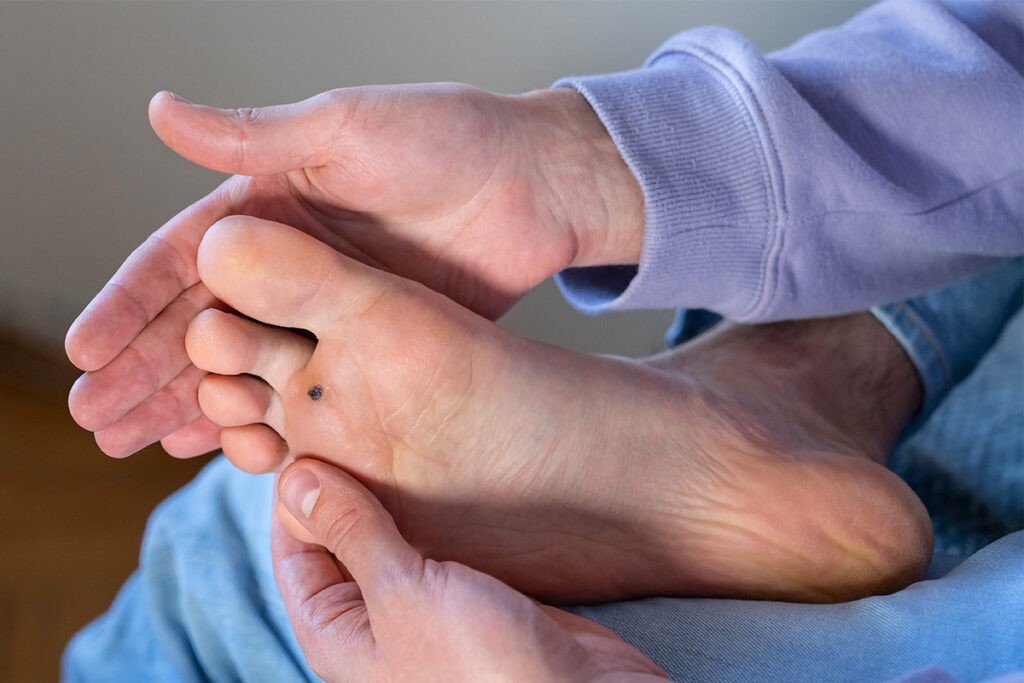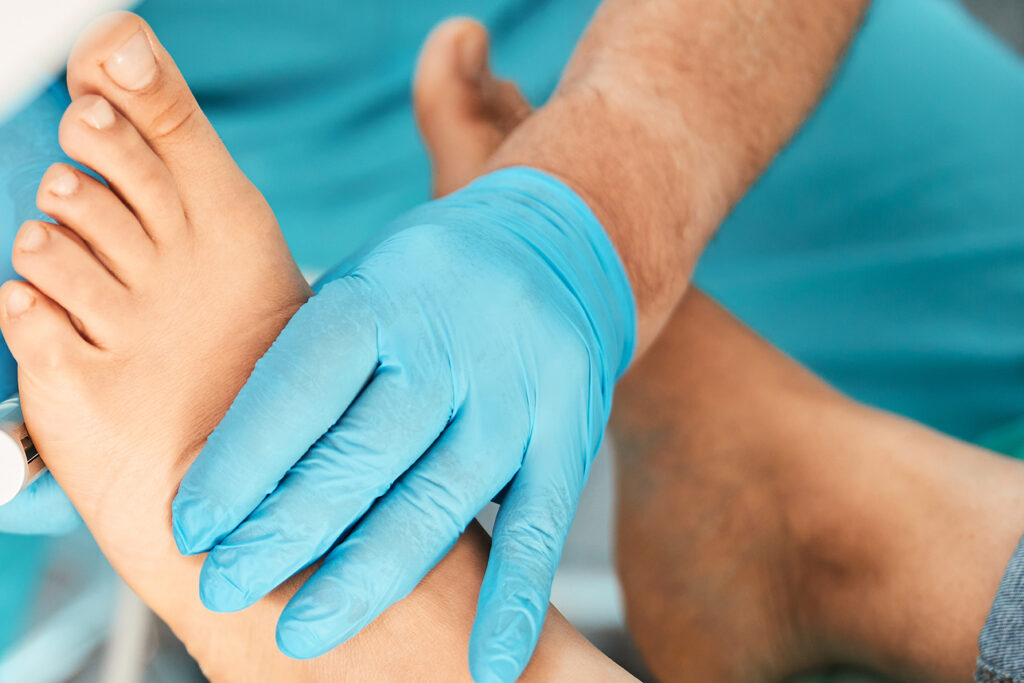What causes a verruca on the feet?
Verrucas are caused by the human papilloma virus (HPV) and are contagious, meaning they can easily spread from person to person.
The verruca viral infection is highly contagious, and can be picked up in a wide range of places. In particular, it spreads quickly through barefoot contact with the virus that is deposited on the floor by another carrier – for example through communal shower areas, swimming pools, changing rooms or hotel bathrooms.
The virus can also survive outside of the human body for a significant amount of time, meaning that even shoes or trainers can carry the infection and lead to its spread!
Why verrucas are common with school children
School children often seem more prone to verruca infections. This is due to the frequent changing for sports in a shared environment. Just one student verruca infection on the underside of the foot, can easily be passed on through contact with the floor – leaving their peers at risk too!
The HPV virus contact with another child’s foot may result in infection and verruca growth.
A highly contagious virus
Verrucas which are the Human Papilloma virus (HPV), are the same as Warts which may occur on the hands or any part of the body. The medical word for Verruca is ‘Plantar Wart’.
While the HPV virus can affect any area of the body, it is most seen in the form of warts on the hands, feet, face and genitals. The infection can be spread through skin-to-skin contact or by direct contact / touching contaminated surfaces.
Also the infection can easily spread locally – from foot to foot or foot to hand etc so care must always be taken when treating or any HPV virus contact.
How to treat a verruca on the foot
A verruca HPV virus can be a stubborn skin condition and difficult to resolve.
The human body is equipped to fight off HPV with its natural immune system. But the immune system may not fully achieve this resulting in the verruca non-resolution and further growth or spreading.

MYTH – there is a myth that various types of verruca treatment can eradicate the viral infection. But like the common cold or flu viral infections can’t be easily treated by medication.
Verruca treatment are based on principle that tissue trauma to the verruca (acid, freezing, laser, microwave) will stimulate the immune system and the immune system eradicates the virus.
Therefore, typical verruca treatment methods target the infected tissue to jumpstart an immune system response. This process stimulates your body’s immune system, effectively eradicating the HPV virus, verruca or wart infection.
Here are some examples of treatments:
- Over the counter (OTC) – acid or freezing treatments (Note: Take care when treating at home – to stay safe, consider wearing gloves when treating yourself at home – you don’t want to risk catching or spread the virus and potentially getting warts on your hands)
- Professional treatments – freezing / acid / microwave / laser
Over the counter treatments may not always provide a complete solution, so if you’re experiencing persistent verruca issues affecting your feet consider visiting an experienced Podiatry Clinic, like Farnham’s Waverley Foot Clinic for professional treatment.
Podiatry verruca treatment
Podiatry verruca treatment is a specialised form of medical care that is used to treat verrucas. It involves the use of various methods such as laser treatments, stronger acid treatment or much colder freezing to eliminate verruca’s completely.
A typical course of podiatry verruca treatment requires three to five sessions depending on how long the verruca has been present and its size. Each session of treatment stimulates the body’s immune system to fight against and eradicate the Human Papilloma Virus (HPV).
Klaser is the latest technological advance in treating verrucas. This new simple, minimally invasive treatment uses light energy to treat the virus directly which stimulates an immune response to eradicate the infection.

Post treatment – long term verruca prevention
Verrucas / HPV virus is highly contagious. Just like the common cold it’s possible to catch them again. Therefore, it is important to remain vigilant when using public facilities such as swimming pools or changing rooms and remember that the virus can be transferred from one foot to another on contaminated surfaces or objects like towels and shoes.
Wearing flip flops in areas where there is a high risk of infection such as shared showers at gyms, swimming pools and sports centres, as well as locker rooms at schools or workplaces. Taking proactive steps to protect your long-term health is key. Be sure to check your feet for any signs of verruca infection regularly to enable early advice about treatment should and infection occur.
Book with the Waverley Foot Clinic Farnham
Finally, if you think you or your child may have caught a verruca it is important not to worry but instead seek medical advice immediately. Waverley Foot Clinic will discuss treatment options and help enable successful verruca resolution as soon as possible.
Please contact Waverley Foot Clinic for a verruca and verruca treatment consultation by calling 01252 716611
